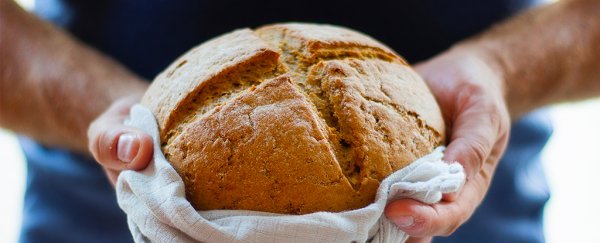If you're one of those people who don't have coeliac disease but still think gluten is causing your gut problems, scientists may finally have a clue as to what's going on.
Studies have been pointing towards 'gluten sensitivity' not being a real thing. But plenty of people seem to have stomach upsets when they eat bread - and now a study shows that it's probably nothing to do with gluten, but there's another wheat component to blame.
Coeliac disease manifests as an immune response to gluten, a family of proteins found in grains such as wheat, rye, barley and oats. Based on various studies, prevalence of coeliac disease in an average population can be up to around 1.3 percent.
Yet the percentage of people who report adverse symptoms when they eat wheat is significantly higher. The exact prevalence of non-coeliac gluten sensitivity (NCGS) as it is called, is unknown, although a recent study suggests it could be as high as 13 percent.
And because gluten has been turning out to be an unlikely culprit, a growing body of research has been looking at what's actually going on.
Peter Gibson of Monash University and his team have performed extensive research into NCGS, and discovered that short-chain carbohydrates (Fermentable Oligosaccharides, Disaccharides, Monosaccharides and Polyols - also known as FODMAPs) - could be responsible.
These ferment in the gut, causing bloating and other unpleasant symptoms. A study published in 2014 showed that a diet low in FODMAPs can reduce the symptoms of irritable bowel disease.
Now Gibson's team has drawn a correlation between adverse gastrointestinal symptoms and a type of FODMAP carbohydrate called fructan.
The researchers recruited 59 people who don't have diagnosed coeliac disease, but who eat a strict gluten-free diet. The participants were given seven-day supplies of specially formulated muesli bars - one type contained gluten, one type contained fructan, and one type contained neither (the control placebo).
Divided into three groups, the participants would eat one type of bar for seven days straight and record any irritable bowel symptoms in a specialised questionnaire. Then they had a week's break to allow any symptoms to dissipate, and moved on to the next type of bar.
The study was double-blind, as neither the participants nor the researchers knew which type of bar they were eating on any given week.
At the end of the trial, all 59 people had eaten all three types of muesli bar, allowing the researchers to compare the reported symptoms with the actual contents of what the participants had eaten.
The team found that, compared to the placebo, the fructan bar triggered 15 percent more bloating and a 13 percent increase in gastrointestinal symptoms. There was no difference in scores for these symptoms between the gluten and placebo groups.
The results suggest the reason for why people who go on a gluten-free diet to ease symptoms of NCGS often can't make a full recovery. Fructans are found in grains such as wheat, rye and barley, but also appear in other foods, including artichokes, asparagus, garlic, and onion.
"Gluten was originally assumed to be the culprit because of coeliac disease, and the fact that people felt better when they stopped eating wheat," Gibson told New Scientist.
"Now it seems like that initial assumption was wrong."
The research has been published in the journal Gastroenterology.
